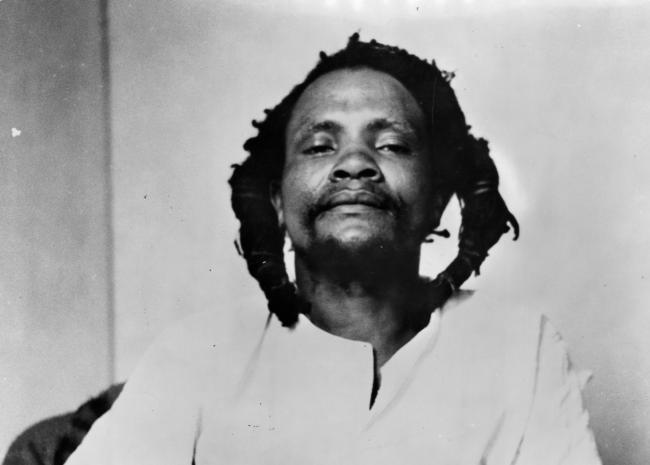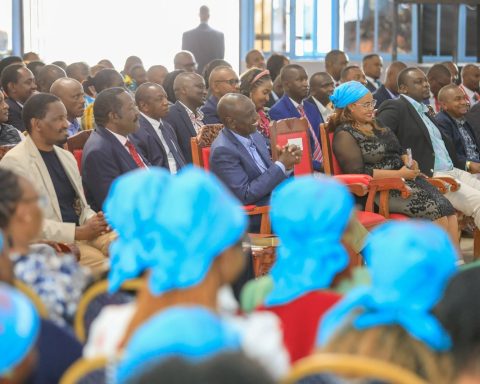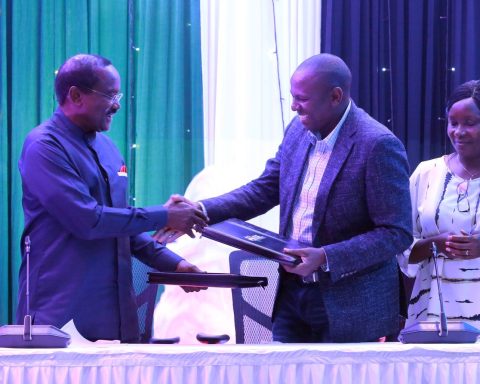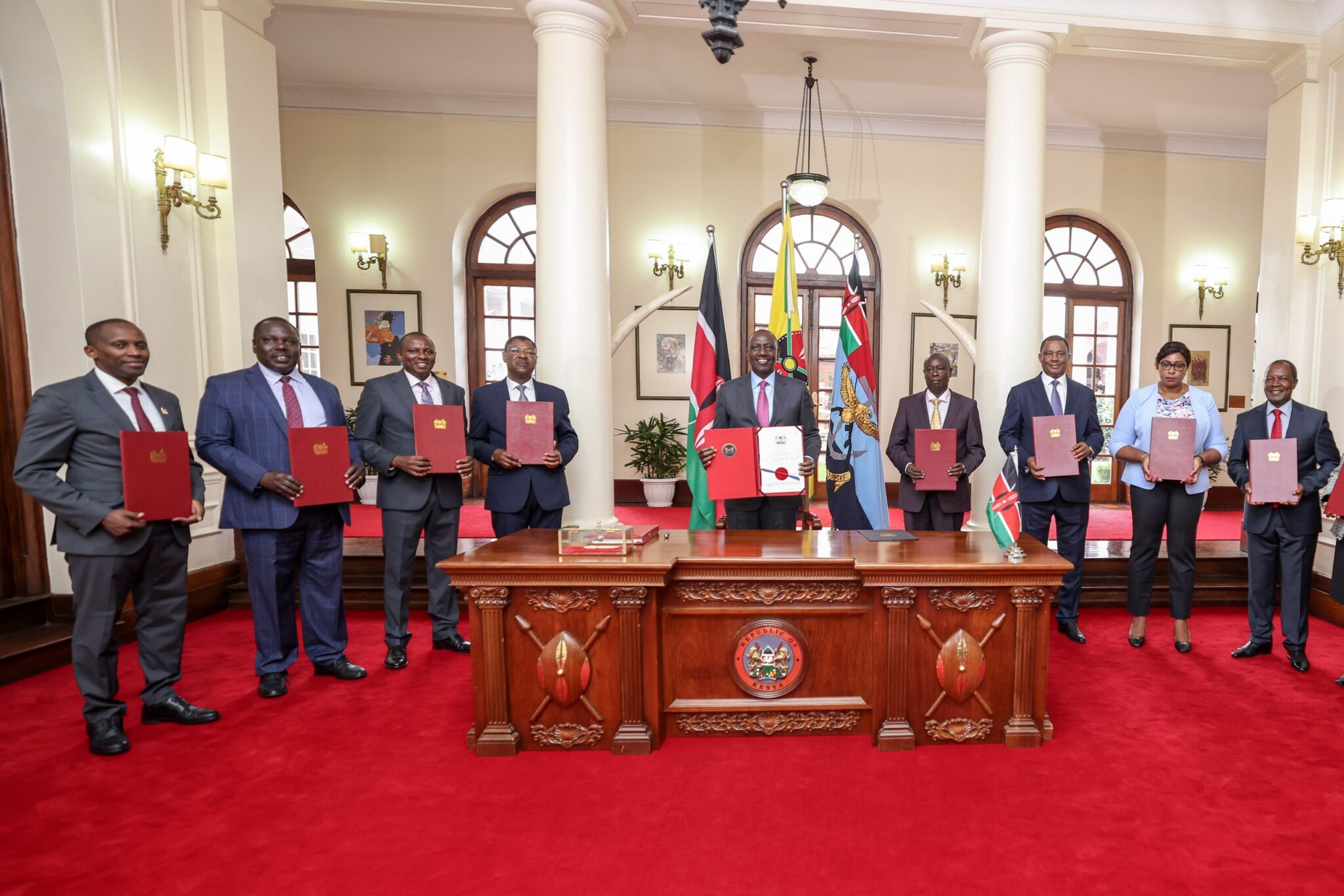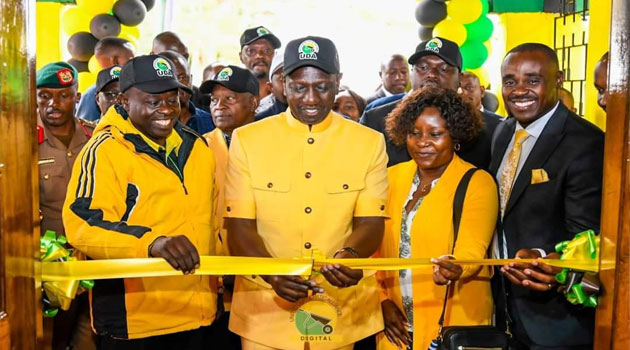First of all, let us start with the obvious strategy of the nation.
Read: Kenya at 60 Years of Age. Why are we Still Such a Sick Country? But Yes, We Are Indeed a Nation.
Today, we have the NADCO report for Kenya’s future and already, there are rumbles even in Azimio.
Does anybody remember the 1992 FORD Revolution? Moi was on the ropes then following his massive detention of Kenyan patriots in numbers rivaling the colonial war on Kenyans in the 1950s.
The Freedom for Democracy in Kenya (FORD) came alive — astonishing and grabbing the full attention of the nation.

These are some of the real movements that have transformed our country in many ways and the nation is proud of them.
And now here we are:
Raila Odinga’s Conditional Support for NADCO Report and Its Implications.

According to media reports, the political landscape of Kenya is experiencing a remarkable shift, with the Azimio la Umoja coalition and its leader, Raila Odinga, drawing significant attention.
“Their engagement with the National Dialogue Committee (NADCO) and the broader political dynamics are shaping the narrative around governance and public welfare. Key themes demanding scrutiny include Raila Odinga’s conditional support for the NADCO report, the coalition’s stance on issues such as the high cost of living and the housing levy, and the implications for the 2022 presidential race.
Azimio la Umoja’s Conditional Support for NADCO Report
Raila Odinga’s support for the NADCO report, contingent on the proposal for the creation of the Office of the Leader of the Opposition and the embedment of the Office of the Prime Cabinet Secretary, emphasizes the importance of democratic processes and the need for popular participation in shaping the country’s governance structure.
However, dissenting voices have emerged within the coalition over the report’s failure to address pressing issues such as the high cost of living, reflecting the complexity of coalition dynamics and the gravity of the challenges facing the country.
High Cost of Living: A Contention Point
The issue of the high cost of living has become a focal point, with the Azimio coalition advocating for measures to alleviate this concern. Despite this, the government’s reluctance to engage meaningfully on this issue has fueled tensions and raised questions about its responsiveness to the people’s plight.
The rejection of the NADCO report by key opposition figures and the Jubilee Party, alongside the dissent within the coalition, paints a picture of a political landscape riddled with discord and divergent interests.
Political Maneuvers and the 2022 Presidential Race
The recent developments also highlight the interplay between political maneuvers and public welfare, especially in the context of the upcoming 2022 presidential race.
Raila Odinga’s assertion that he will not retire from politics until he delivers the “third liberation” and his readiness to endorse a presidential candidate only after winning the 2022 bid illustrates a firm determination to shape Kenya’s political landscape.
The importance of the Building Bridges Initiative (BBI) in fostering national unity and averting electoral turmoil further underscores the underlying objectives of political realignments and reforms.
In the midst of these developments, the role of democratic institutions and the judiciary in upholding constitutional principles and ensuring accountability is crucial.
The High Court’s declaration of the housing levy as unconstitutional, followed by Raila Odinga’s call for Kenyans to stop paying the levy, reflects a broader struggle for legal and constitutional adherence. The judiciary’s role in safeguarding citizens’ rights and holding the government accountable underscores the broader theme of institutional integrity and the rule of law.
As Kenya navigates these complex dynamics, the implications for governance, public welfare, and the democratic process are significant. The divergent perspectives within the Azimio coalition, the government’s response to critical issues, and the evolving alliances and aspirations in the run-up to the 2022 elections all contribute to shaping Kenya’s political future. The need for inclusive, transparent, and responsive governance remains paramount in this evolving landscape”
AZIMIO STATEMENT ON NADCO REPORT; NOVEMBER 29, 2023:
”After three months of difficult negotiations, the National Dialogue Committee submitted its
report last Sunday.
As we all recall, the talks were preceded by a stolen election, sweat, tears, police brutality and
death, amid a steep rise in the cost of living, which has only got worse as the talks concluded.
We want to thank all the people of Kenya, the media fraternity and other stake holders, for
exercising great patience and restraint as the dialogue continued.
I thank the members, from both sides of the talks, for the commitment and dedication to national
duty. After the initial tension and mistrust, which was expected, the parties jelled and worked
well together. Trust returned in their ranks and they were then able to show a strong commitment
to peace and reconciliation and the strengthening of institutions and governance processes in
Kenya.
The document the team has come up with is, ultimately, imperfect and unfinished. But it is a
beginning.
We have agreed to disagree on the most important matter to us. We made what believed were
reasonable proposals on how to address the rising cost of living. But the government side flatly
refused terming it their exclusive business and further arguing that they got the mandate of
Kenyans to execute their Kenya Kwanza economic agenda.
We will be engaging Kenyans further in the coming weeks as we must because the pain of the
cost of living is really unbearable. In the coming weeks the majority of Kenyans will be carrying
the burden of increased school fees and increased healthcare costs; besides the many crises in
both the education and health sectors. Employees of the NHIF are now in limbo not knowing
their future employment status.
Be that as it may, we have come this far because of a commitment to constructive engagement
and positive energy and sacrifice for the sake of our beloved country Kenya
Our team was able to get positive results on a number of the issues that we had set out in our
demands.
These include Electoral Justice which encapsulates audit of the 2022 election process, restructuring and reconstitution of the IEBC, increase of the timelines for the Supreme Court to hear and determine a presidential election petition from 14 to 21 days and a commitment to the spirit and fidelity to multiparty democracy.
We were also able to agree on the transfer of all devolved functions and the requisite resources to the county governments in addition amending the Constitution to provide for the equitable share to the County Governments to not less than20% of all revenue collected by the National Government from the current 15% and the establishment of the Ward Development Fund.
We believe that these are significant reform mileages that, if implemented, can help strengthen
our governance and electoral processes and safeguard the march of democracy in Kenya. Azimio however remains deeply disappointed that the committee was not able to agree on the one fundamental issue on which Kenyans are united across the political divide.
The two teams were unable to agree on the need and the means to reduce the cost of living. This is why we have described the document the Committee presented as imperfect and unfinished. It was not for lack of trying on our part that the committee was unable to agree on the issue of cost of living.
Kenyans will recall that at the beginning of the talks, the Kenya Kwanza administration was adamant that cost of living would never be taken to the discussion table, let alone being discussed.
Kenya Kwanza had insisted that the only issues it was ready to discuss were: The reconstitution of the IEBC, the Implementation of the Two-Thirds Gender Rule, Entrenchment of the Constituency Development Fund, Establishment and the entrenchment of the Office of the Leader of the Opposition and embedment of the Office of Prime Cabinet Secretary.
Through persistence and insistence, we forced cost of living on to the table. We had hoped that as the talks progressed while life got harder for Kenyans, Kenya Kwanza leaders could have the empathy, soften their hearts and agree to lessen the burden their policies had imposed on Kenyans.
Our delegation pushed for the complete overhaul of the Finance Act 2023, which had come with harsh taxation measures that made and continue to make life unbearable to an overwhelming
majority of Kenyans.
At no expense to the government, we deployed our team of economists to recommend to the administration measures which, if adopted, would immediately bring the cost of living down. We asked the government to reduce travel budgets by 50%.
We also called on the government to reduce the Daily Subsistence Allowances for State and Public Officers by 30 per cent.
We further asked the government to reduce the road maintenance levy and the anti-adulteration
levy by Sh5 and Sh3 per litre respectively.
Our team further asked the government reduce VAT on fuel from 16% to 8%. We called on the government to scrap the housing levy or at least make it voluntary and the courts have finally
agreed with the Azimio position.
Unfortunately, Kenya Kwanza would not budge. Apparently, as the regime’s economic policies hardened life for Kenyans, so did the regime harden its heart.
We realized that without the good will of the top echelons of the Kenya Kwanza leadership, cost
of living was never going to be addressed. They told our team that cost of living was a
government issue; that they have a manifesto and the mandate of the people of Kenya to
implement it.
Our team realized that the whole issue of cost of living is extremely sensitive in Kenya Kwanza
circles because it is a gravy train on which many corrupt interests have converged.
Cost of fuel and food cannot come down because key people in government are eating from it.
That is why Cabinet secretaries and other Kenya Kwanza shareholders recently fought over oil in
the high seas. That’s why KNTC is struggling with imported food commodities that are more
expensive than locally sourced food.
We got to understand that the Housing Levy, which even the courts have now found to be
unconstitutional, cannot be scrapped because it is a gravy train. It is from this levy that Kenya
Kwanza hopes to build a campaign war chest for the next election. They forget that they may not
get there.
We realize that Kenya Kwanza cannot touch cost of living because it anchors the massive corruption that has returned to the country.
We made it clear that we completely disagree completely with the government on the matter of cost of living. We made it clear that we will support the document ensuing from the talks but we will treat the hardline on the cost of living as the beginning of another phase of this struggle.
We will seek other ways to press the government to listen to the cries of the people and bring down the cost of living. The other ways will include but will not be limited to consultations with the people. At all times, we will retain the right to call on the people to take steps that we deem necessary to force the government to lower the cost of living.
We also support the document with a proviso that certain aspects must be approved by the people by way of a referendum.
To create the office of the leader of opposition or to formalize the office of the prime cabinet
secretary, the people of Kenya have to have their say by way of a referendum.
Besides it is a constitutional requirement that such significant restructuring of government must go through a referendum to avoid the mischief that may be played by some people going to court. It is also our stand that this country cannot continue moving forward by being undecided.
We have to agree on whether we want a parliamentary, presidential, or hybrid system.
Thank you.”
The actual NADCO report as we know is 295 pages. I have it myself thankfully.
Where is the cost of living in those pages? That is what Kenyans are asking and it it is not just Martha Karua. It is all Kenyans from all communities.
For Jamhuri Day we have the patriots of yesterday and today. They don’t need anybody’s permission to stand for the country and move us forward. They have done it all their lives. We thank them and other Kenyan freedom fighters for Kenya’s 60’th Jamhuri Day. The next sixty years are going to be a lot better for the nation. Of that we promise. That is what RPP is all about.
Fortunately Kenyans patriots like Dr. Willy Mutunga are out there telling the country where we are and where we must go for the sake of the country. That is great

WILLY MUTUNGA: Hustlers have realised they were lied to
“Were hustlers duped? And which do we celebrate? Independence or Resistance?”
On the 60th anniversary of our independence (12 December 2023), I glorify and celebrate the links and continuities of our resistance for land, resources, and freedom.
I also celebrate and glorify the struggles the world over for a just, free, peaceful, non-militaristic, non-eugenist, non-racial, non-sexist, non-ethnic, gender-just, ecologically safe, prosperous, equitable, and socialist planet.
Once President Moi prophesied that the nationalist party at independence, Kenya African National Union (Kanu), would rule our Motherland for 100 years.
The various Kanu dictatorships since independence celebrate their sixty years of misrule, yet again.
The youth of this country needs to ensure that Moi’s prophesy does not come to pass.
They should know there will be in this country a national democratic revolution under the leadership of a political leadership that is, at a minimum, anti-imperialism and anti-comprador bourgeoisie. The latter rule the country as agents of the latter.
Kenyan history has to focus on 68 years of colonialism and 60 years of neocolonialism.
Both periods have witnessed the theft of our lands, resources, and freedom, unacceptable poverty and inequality; the denial of the people’s material interests such as universal education, universal healthcare, shelter, water, clean environment, and sanitation; and unacceptable unemployment that denies us of our human dignity.
Both education and employment are part of the fundamental mainstay of human dignity.
This history of 128 years is also our history of heroic resistance and struggles against foreign domination, oppression, and exploitation.
Colonialism was resisted from the beginning of its occupation. We have our heroines and heroes of this resistance. History has recorded these struggles.
The Mau Mau Liberation Movement, with its armed wing known as the Kenya Land and Freedom Army (KLFA), has erroneously been called the “peak” of these struggles when in fact the struggles have continued.
The independence movement was a link and continuity when the KLFA retreated from the War of Liberation.
After independence there have been resistance underground and above ground by movements: Trade Unions, Women’s Rights Movements, Cooperative Movements, Patriotic media, the December Twelfth Movement, Mwakenya, the struggles for human rights, social justice, and struggles for national democratic and transformative Constitution.
We have also had our radical and patriotic political opposition ever, the Kenya People’s Union (KPU), whose radical Wananchi Declaration is reflected in some of the provisions of the Constitution of Kenya 2010.
Now our fifth liberation is about the struggles to implement the 2010 Constitution through a political leadership that is anti-imperialism and anti-comprador.
Such political leadership will end the politics of division (race, ethnicity, clans, gender, generation, region, religion, occupation, and English Premier League) and build a united sovereign nation that births the politics of issues, global, regional, and national.
As surely as I see an uprising in Kenya on the horizon I can also see such an alternative political leadership on the horizon. That is my prophecy.
In both periods we have witnessed foreign domination, exploitation, oppression, and attacks on our sovereignty as a people. We remain in a slave plantation called Kenya where the national rulers or agents are what Malcolm X famously called “house niggers.”
Our comprador bourgeoisie is the ancestors of our version of house niggers, the chiefs, religious leaders, politicians, corporate entities, and our 8300 billionaires that benefit hugely from our recolonisation and occupation.
This comprador class has benefited from being supporters of the masters of the plantation in Kenya. The refrain “the British never left” is still true.
Of course, our international situation is our occupation and lack of freedom, thanks to the foreign domination, exploitation, and oppression we daily experience from the West and East.
Since World War II, and before the collapse of the Soviet Union in 1989, revolutionaries have described this international situation as based on the imperialism of the Triad (US, Europe, and Japan), the social imperialism of the Soviet Union, and the emerging social-imperialist superpower of China.
After the collapse of the Soviet Union, we see struggles for a multi-polar world, best expressed in the coalition called BRICS. Collective Africa is a bystander of these developments although it is the one that faces the danger of continued occupation and colonisation.
China’s policy of recolonisation debts has been euphemistically dubbed “legal” by those in Africa who see China as a liberating country for the downtrodden of the third world.
We should expect such solidarity from China. Indeed, they call it cooperation, which is a euphemism for the acceptance of being dominated, occupied, and exploited.
It is also our international situation that wars are going on the danger of superpowers inflicting the planet with World War III looms large. Here, I am not a prophet of gloom and doom. That war remains on the cards.
We, in Kenya, should start discussing this international situation seriously. We seem to focus on the comprador bourgeoisie and their respective factions and their struggles.
None of the factions has the will or the desire to run to Kenyans when orders are given to them by foreign interests.
We all know that chiefs, home guards, wanyaparas, bwenyenyes do not have the love of the Motherland to do such a thing. Their wealth, status, and future are anchored on them being eternal sellouts of the Motherland.
President William Ruto should be praised for a political campaign in 2022 that brought the class question into the open. He coined the two classes as dynasties and hustlers.
There is no doubt this campaign caught the imagination of the hustlers, Kenya’s working class. Now the hustlers have realised they have been lied to.
The middle classes know they have subsidised the dictatorships since independence through their acceptance of politics of division.
Now it is the time to connect the links and continuities for resistance under the current situation.
The best way to do that is to announce the birth of a movement and a political party that will midwife the new struggle against foreign interests and compradors.
The youth of this country should realise they have two options: Form both the movement and national party I have called for or face without any preparation the realisation of Ngugi wa Thiong’o’s prophecy that Mau Mau is coming back.
Wa Thiong’o’s prophecy has always been the nemesis of Moi’s prophesy.
Mau Mau comes back when you realise that the Motherland belongs to foreign interests. And that the country is still a slave plantation.
In another news I was a little surprised to see William Ruto and usual photo seeking KK types holding something called Kenya Diaspora Conference in Nairobi. How many people from the Kenyan diaspora were in Nairobi for that conference? None at all.

The media tells us that President William Ruto on Wednesday presided over the official opening of the second annual Kenya Diaspora Investment Conference (KDIC).
The three-day conference is themed ‘Tujenge Kenya; Bridging Borders, Building Futures’.
It aims to highlight and present investment opportunities across various sectors of the economy to members of the Diaspora while engaging in discussions regarding the legal and regulatory framework related to diaspora investments.
It also seeks to facilitate networking and collaboration among different stakeholders.
First of all Kenyans living outside which numbers in millions are supposed to be voting in Kenyan elections. Has the Kenyan government made that possible. No and they are not interested we understand and quite frankly with the incompetent government in Kenya today that is not going to happen.
In 2022 the Kenya Diaspora contributed Sh. 483 billion to the Kenyan economy and was the biggest provider in forex money. I am one of those who send money to Kenya every two weeks when I get paid and I have done so for thirty years from Canada and we do a lot of good business with my family in Kenya and I as frequent as I can.
The Kenyan Diaspora is capable of contributing trillions of money to the economy every year. I have presented my ideas on how that can be done and it starts with allowing Kenyans living out of the country to bring investment equipment to the country like tractors, bakery tools, manufacturing stuff and more importantly pharmacy and medical producing equipment to the country without tax duties and VAT.
Can the Ruto government do that? Of course they will not do that and it is a waste of time even talking to them about that. So as Kenyans in Diaspora we will shut that discussion down until Kenya has a credible and sensible government after Ruto. If Kenya unleashes the Diaspora capacity and potential it will be a complete game changer for our economy. Dancing at KICC will not do it. We know that.
I have a nephew in Nairobi who is a top pharmacist in one of Nairobi’s first class hospitals. In Canada we have a pharmacist who says he can export medical supplies to Kenya at a very good price. What is the problem? The system doesn’t work. How can we sort it out?
Also on Jamhuri Day, I wanted to remember Comrade Onyango Oloo who passed away in June 2019. There is nobody in Kenya who has done as much work for human rights as Onyango Oloo. He was arrested in Naivasha after the August 1, 1982 coup attempt and jailed for many years. He was 20 years old barely.
After he came out of prison he was exiled first to Tanzania and then to Canada for many years and later came back to Kenya where he died. Onyango Oloo is one of the greatest souls you will ever meet. I had the good luck of working and living with him for many years.
Onyango Oloo, Muhoro Githirwa, and I arrived in Canada as refugees on November 29, 1989. It was freezing there and we were wearing T-Shirts. We were all given winter uniforms the same color. And we were put in one place at Pape St. We looked like clowns in uniform. But we knew we were better than that by every means.
In Canada, Oloo was the inventor of social media when he started the Kenya Democracy Project in 2004 and later set up Jukwaa as a prominent Kenyan website.
After that OO as we call him set up the Jukwaa website and it was in the middle of the war against Moi and his regime and it is still alive.
Happy Jamhuri to the Comrades and the nation is in order and the war is on. We are there with all our tools. We want to say thanks to comrade David Onyango Oloo.

Onyango Oloo then started and established Jukwaa one one of the most prominent websites in the nation ever.
And the inevitable happened. The Ruto thieves are now out of any trouble and will soon be in his government to steal more. Fine. We will meet them there as we always do.


